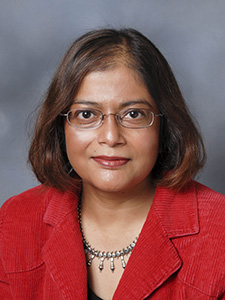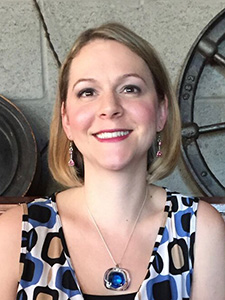AAS Solar Physics Division Announces 2018 Prizewinners
Henry Winter ARISA Lab, LLC
This announcement is adapted from press releases issued by the AAS Solar Physics Division:
 Sarbani Basu (Yale University) is receiving the AAS Solar Physics Division (SPD) 2018 George Ellery Hale Prize for outstanding contributions to the field of solar astronomy. She is being celebrated for more than two decades of work to better understand the Sun and other stars by using helioseismic data.
Sarbani Basu (Yale University) is receiving the AAS Solar Physics Division (SPD) 2018 George Ellery Hale Prize for outstanding contributions to the field of solar astronomy. She is being celebrated for more than two decades of work to better understand the Sun and other stars by using helioseismic data.
"Stars like the Sun quake all the time, so much so that they 'ring' like bells. Each one rings with a specific set of frequencies, or tones. These tones and overtones are related to the star's internal structure. I use this connection to find out about the internal structure of stars, which is otherwise hidden from us," said Dr. Basu as she was describing her work. "If we were to study the Sun on its own, we could not possibly determine what it would have 'sounded' like when it was younger or how it might ring when it's older. The study of other stars, some more massive than the Sun and some less massive, some older and some younger, gives us the context in which to interpret our observations of the Sun."
"Sarbani Basu has a sustained, outstanding quality of work over an extended period of time and has made substantial contributions across a most impressive range of topics in solar and stellar physics," said Haiman Wang, chair of the SPD prize committee. "The extremely productive linkages that she has built between solar and stellar astrophysics have benefited all of solar physics."
"Of course it is wonderful to know that my peers think my work is important," said Basu. "George Ellery Hale was one of the pioneers of solar physics, and to receive the prize named after him is a great honor." Basu plans to continue her work using NASA's Solar Dynamics Observatory (SDO) and the upcoming Transiting Exoplanet Survey Satellite (TESS) mission, which will allow her to study the ringing of a larger collection of stars.
 Nicholeen Viall (NASA Goddard Space Flight Center) is receiving SPD's Karen Harvey Prize, given annually to an early-career scientist who has made outstanding contributions to the study of the Sun. "Nicki has studied the solar wind and its effect on Earth's magnetosphere, analyzed data from the Heliospheric Imager on the STEREO probes, studied the coronal heating problem, and won a very competitive NASA postdoctoral position," said Wang as he listed off Viall's many accomplishments. "She has been very productive on each of these projects but has also invested considerable effort to engage with the public and show them the importance and excitement of solar physics."
Nicholeen Viall (NASA Goddard Space Flight Center) is receiving SPD's Karen Harvey Prize, given annually to an early-career scientist who has made outstanding contributions to the study of the Sun. "Nicki has studied the solar wind and its effect on Earth's magnetosphere, analyzed data from the Heliospheric Imager on the STEREO probes, studied the coronal heating problem, and won a very competitive NASA postdoctoral position," said Wang as he listed off Viall's many accomplishments. "She has been very productive on each of these projects but has also invested considerable effort to engage with the public and show them the importance and excitement of solar physics."
"Space weather is something that the general public is becoming aware of, and that is awesome!" said Viall about her work in engaging the public in the science of the Sun's interactions with Earth's environment and magnetic field. Despite all of her accomplishments, she was still shocked when the SPD Chair, Holly Gilbert, told her she was receiving the Harvey Prize. "Holly is my boss's boss at NASA, so when she asked if she could chat with me, I assumed it was something about work, not that I had won a major award!"
Even with the recognition of her exceptional body of work to date, Viall is optimistic that the best is yet to come. "We are in an exciting time for solar physics. NASA's Parker Solar Probe (PSP) and the European Space Agency's Solar Orbiter are two upcoming missions that have the potential to revolutionize what we think about the Sun," she said. As someone who is studying how the solar atmosphere, or corona, is heated Dr. Viall is especially looking forward to PSP's ability to "stick a thermometer in the upper corona and get exact plasma measurements," which will help her unravel the mysteries of our Sun and how it affects the Earth.

